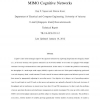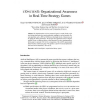276 search results - page 28 / 56 » A control theoretic approach to noncooperative game design |
INFOCOM
2012
IEEE
11 years 10 months ago
2012
IEEE
Cognitive radio (CR) techniques improve the spectrum utilization by exploiting temporarily-free frequency bands (i.e., in the time domain). The spectrum utilization can be boosted...
CCIA
2010
Springer
13 years 2 months ago
2010
Springer
The implementation of AI in commercial games is usually based on low level designs that makes the control predictable, unadaptive, and non reusable. Reorithms such as HTN or GOAP p...
CHI
2010
ACM
14 years 2 months ago
2010
ACM
Adaptability to the needs of end-users has been identified as a key requirement for technologies designed to support mental health interventions. The PlayWrite system allows end u...
ICC
2007
IEEE
14 years 1 months ago
2007
IEEE
— For cognitive radio networks, a popular approach to dynamic spectrum allocation (DSA) is game theoretic, which improves spectrum efficiency in a distributed manner. In a doubl...
SOFSEM
2009
Springer
14 years 4 months ago
2009
Springer
Abstract. Computational mechanism design (CMD) seeks to understand how to design game forms that induce desirable outcomes in multiagent systems despite private information, self-i...


